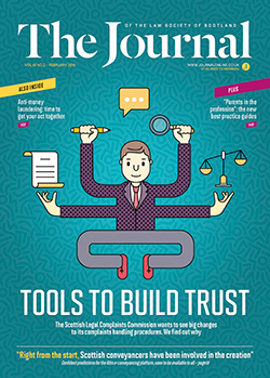Opinion: Daniel Donaldson

When we established Legal Spark, we embarked on a journey to help solve a social problem, namely the affordability of legal advice and the absence of legal aid. We wanted to set up a social enterprise as a new type of legal practice that existed to generate a profit, but use it for social impact.
Social enterprise is a growth industry in Scotland. It is a way of doing business, not a specific legal structure. A social enterprise can be described as a business that trades for a social or environmental mission, redistributing profits into that mission. Currently we reinvest our profits in community or educational legal outreach work, providing advice and representation for disabled people, with a commitment to legal aid work.
Our business plan involved setting up first under a more traditional law centre model, with a principal solicitor working in-house and any income generated not going to the solicitor personally but being reinvested in the law centre’s work. At a later stage, we aimed to move to an alternative business structure (ABS), with a new offering of community or stakeholder ownership. One planned initiative involved working with several equalities groups, in particular to create a disability-focused legal practice. Another was to establish a community-run legal hub.
The challenges were the restrictions on the Scottish legal profession, both in terms of the Society’s practice rules and the regulatory constraints, particularly the non-implementation of the ABS legislation.
It’s unfortunate that the legislation and rules are holding things back for us. The majority of practice rules are based on the traditional firm or partnership model. The Society’s staff have been supportive, showing genuine recognition that innovation is necessary in order to modernise the legal profession, but the Society lacks the capacity to overcome the inflexibility in the system. When an entrepreneur wants to do things differently, and in our case help to solve a social problem for the public benefit, challenges are inevitable.
For example, what does it mean for the Client Protection Fund? Will there be a practice unit, and a manager of the unit? Who owns this business? What happens if you employ non-solicitors to do “regulated” legal work? What about the accounts rules; the money laundering rules?
It’s not easy navigating the plethora of practice rules. However, at every stage we were reminded that Parliament had intended solicitors to work for the public good as well as for private profit. Surely, then, the rules should be flexible enough to allow us to succeed?
The biggest problem with the traditional law centre model is that the principal solicitor is left carrying the liability should the business fail. In any business, particularly when starting something new, it is important that risk is managed. This is why Parliament established incorporated vehicles, to protect entrepreneurs and investors. Traditional legal practice does not have this protection. Is this fair, especially to the principal who dedicates their practice to the public good?
We have not formed a legal firm, to protect the interests of those who work for us and also invest in us. We also could not technically allow non-solicitors to contribute financially, but are using our social entrepreneurship skills to find work-arounds.
To avoid a culture of grant dependency, our business must generate its own income. This is important to maintain the independence of legal services, to determine our own social reinvestments, and not be driven by externally set targets. Most importantly, only through generating our own income will we continue when grants are no longer available.
We have encountered some resistance – even the social enterprise community found us strange – but when you trailblaze as we have done, this is to be expected.
But we are fighters; we are growing our client base, in line with the original business plan. We are now achieving recognition for the work we do and of the challenges we face, and support for our future plans. We are currently looking for legal partners to support us, with whom we can share work and develop collaborative working arrangements. We look forward to the future as Scotland’s first social enterprise legal practice. That spark we started is now aflame.
In this issue
- A trainee perspective on leadership
- Beyond the Bribery Act
- Legal IT: the potential of blockchains
- Directors: the parent over your shoulder
- Ten for starters
- Reading for pleasure
- Journal magazine index 2015
- Opinion: Daniel Donaldson
- Book reviews
- Profile
- President's column
- The big 4-0-0 approaches
- People on the move
- Balance in redress
- Pension allowances: the last chance
- E-conveyancing: the real deal
- Deeds of conditions: not dead yet
- Anti-money laundering: a call to action
- New challenges, new CEO
- Rape terms before the appeal court
- Another year of change
- Defending the abduction
- The right to snoop?
- Fond farewell
- Scottish Solicitors Discipline Tribunal
- Dilapidations: enforcing the bargain
- Title out of nothing
- Charged and ready
- Updates from the OPG
- The family way
- Conflict of interest: the questions still come
- Seeking growth
- Fraud: a battle of wits
- Light to a Safe Harbour
- Through the client's eyes
- Ask Ash
- Law reform roundup






